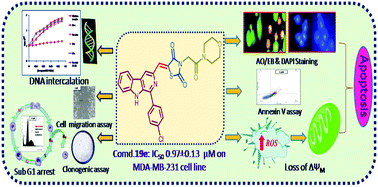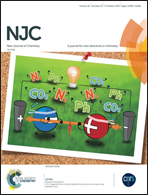Synthesis and in vitro cytotoxicity evaluation of β-carboline-linked 2,4-thiazolidinedione hybrids: potential DNA intercalation and apoptosis-inducing studies†
Abstract
A series of new β-carboline-thiazolidinedione hybrids was synthesized and assessed for in vitro cytotoxicity potential against selected human cancer cell lines, namely, PC-3, A549, MG-63, HCT-15, MDA-MB-231, A431, and PANC-1 along with a normal human cell line (L-132). Among this new series, compound 19e was found to exhibit promising cytotoxic effects against triple negative breast cancer cell line (MDA-MB-231) with IC50 value of 0.97 ± 0.13 μM. Hence, further mechanistic studies of the apoptosis-inducing effect of 19e were conducted on the MDA-MB-23 cell line. Moreover, characteristic apoptotic features such as membrane blebbing, chromatin condensation, and apoptotic body formation were observed with the effect of 19e on MDA-MB-231 cells using AO/EB and DAPI staining. The Annexin V-Alexa Flour 488/PI assay confirmed significant early apoptosis induction. Notably, DCFDA assay indicated that 19e induced ROS generation. Moreover, mitochondrial membrane potential collapse was observed through JC-1 staining by 19e. Furthermore, cell cycle analysis revealed that 19e arrested cells in the sub G1 phase. In addition, clonogenic and wound healing assays indicated inhibition of colony formation and cell migration by 19e in a dose-dependent manner. Next, molecular modelling and DNA binding affinity studies such as relative viscosity, circular dichroism and UV-visible spectroscopy denoted classic intercalation of 19e with CT-DNA with binding constant of 1 × 105 M−1.



 Please wait while we load your content...
Please wait while we load your content...